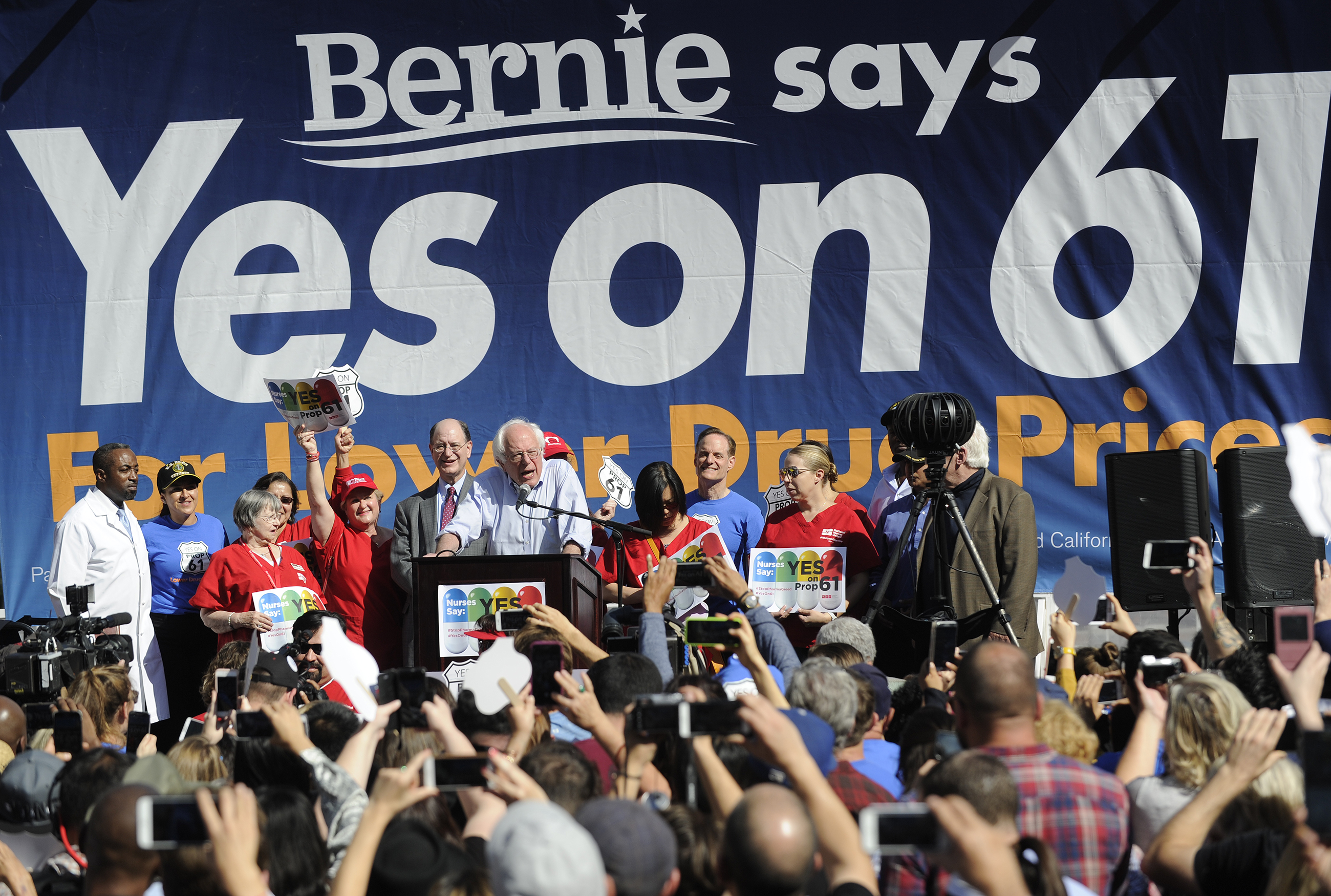Connecting state and local government leaders
Beyond races for the White House and Congress, voters across the nation are considering a wide variety of state and local proposals and initiatives. Here’s our rundown of what’s important to watch ...
While the turbulent and exhausting race for the White House has dominated the nation’s attention during this year’s election cycle, there’s a lot at stake down ballot—and we aren’t talking about candidates running for office.
Voters will also decide on plenty of pivotal state and local proposals, initiatives and questions.
The state and local ballot landscape this November includes major proposals for transportation and infrastructure investments, carbon emissions, education reform, housing and marijuana legalization, just to name a few. In total, voters in 35 states are considering 162 statewide ballot initiatives. There is also a slew of local issues appearing on ballots around the U.S. (In San Francisco, for instance, there are 25 local ballot initiatives.)
With so much to track on Tuesday, here’s what we’re keeping a close eye on ...
STATE BALLOT INITIATIVES, PROPOSALS AND AMENDMENTS
California Proposition 61: Drug Price Standards
This ballot measure would cap the Golden State's spending on prescription drugs at prices paid by the U.S. Department of Veterans Affairs, which negotiates costs for military personnel, receiving the biggest discounts of any government agency. The VA’s 24 percent markdown on standard drug prices would save the state millions of dollars. Pharmaceutical companies have spent heavily on efforts to defeat the measure. Criticism of Prop. 61 has largely revolved around implementation issues, the fear drugmakers will respond by providing fewer discounts elsewhere, and the fact people insured under Medi-Cal won’t see benefits. Recent polls are close, reported Reuters.
Colorado Amendment 69: Universal Health Care Financing
Amendment 69 would establish ColoradoCare, a payment system intended to fund universal health care for residents, in part, through an additional 10 percent payroll tax. Two-thirds of the tax would be paid by employers and one-third by employees for an estimated $25 billion in revenue that would go toward largely replacing traditional private and employer-backed health insurance plans. What most voters want to know: How much will they have to pay for health care? There’s no easy answer to that question. Uncertainties about what will be covered won’t be cleared up unless the measure passes. The Colorado Health Institute estimates patients will have to pay 14 percent of health care costs out-of-pocket to keep ColoradoCare out of debt. But the ColoradoCareYES campaign argues copays will be closer to 4 percent when single-payer system cost savings are properly factored in. Recent polls have shown opposition to the measure outweighing support.
Washington Initiative 732: Carbon Emissions Tax
Initiative 732 would impose a new emissions tax on fossil fuels—such as coal and oil—burned in Washington state. It would be a first-of-its-kind tax among U.S. states. For most fossil fuels, the tax would go into effect on July 1, 2017, at a rate of $15 per metric ton of carbon dioxide emitted. It would rise to $25 per metric ton in 2018. After that, the tax would increase by 3.5 percent annually, plus inflation. The tax would continue going up until it reaches an inflation-adjusted $100 per metric ton. A metric ton of carbon is equal to the emissions created from driving an average passenger vehicle about 2,397 miles, according to the U.S. Environmental Protection Agency. The ballot initiative also calls for gradually lowering the state sales tax rate to 5.5 percent from 6.5 percent, and reducing business-and-occupation taxes for manufacturers. Additionally, I-732 includes an expanded tax exemption for low-income families. Support from environmental groups has been divided for the ballot measure, with some opposing it and others declining to back it.
Florida Amendment 1: Solar Energy Subsidies and Personal Solar Use
If it passes, Amendment 1 would give Florida residents the constitutional right to own or lease solar equipment to generate power for their own use—a right they technically already have under state law. But, it would also ensure that those who don’t use solar equipment can’t be required to subsidize the cost of alternative energy and grid access for residents that do. While the amendment sounds pro-solar, opponents of the controversial measure claim it would help utilities companies maintain their monopoly control over the state’s energy market and give these investor-owned companies the basis to challenge any policy they think unfairly favors solar. Power companies have spent more than $20 million to sell Amendment 1 to voters.
Georgia Amendment 1: Authorization of the State Government to Intervene in Failing Local Schools
If Georgia voters pass Amendment 1, it would trigger the implementation of existing legislation and would result in the creation of a new state agency with another state schools superintendent. Unlike the current superintendent, this would not be an elected position, instead this superintendent would be appointed by the governor, confirmed by the state Senate and would answer only to the governor. This superintendent would have the authority to pick struggling schools to take over and would decide whether to shut them down, convert them to charter schools or run them as part of what’s being called an “Opportunity School District.” These schools would remain in the special district for up to 10 years and may exit only after scoring above a failing performance grade for three straight years. The measure, which has the backing of Gov. Nathan Deal, is a controversial one. Opponents have sued to have the measure removed from the ballot arguing the wording is misleading and the text voters will see does not fully explain the authority of this new superintendent.
Louisiana Amendments 3, 5 and 6: Tax and Budget Related Measures
As the Pelican State grapples with a midyear budget deficit estimated to be about $313 million as of late last month, there are several constitutional amendments on the Louisiana ballot concerning fiscal issues. The amendments passed by at least a two-thirds margin in the state Legislature and require voter approval to be enacted. Amendment 3, in conjunction with companion legislation, would eliminate a deduction corporations can claim for the cost of federal income taxes when paying state income taxes. It would also establish a flat, 6.5 percent corporate tax rate in the state. Under the current tiered system corporate taxes range from 4 to 8 percent. Amendment 5 involves the creation a Revenue Stabilization Trust Fund, with money set aside from taxes on oil and gas production and corporations, to help pay infrastructure and public worker pension costs. Amendment 6 would change which budget funds lawmakers can and cannot tap into when the state faces financial slumps. The Public Affairs Research Council of Louisiana has a user-friendly guide to these and other amendments on the state ballot.
New Jersey Public Question 2: Transportation ‘Lockbox’
New Jersey raised its gas tax last month, for the first time since 1988, by 23 cents per gallon, and this proposal would dedicate all resulting revenue to transportation projects. Gov. Chris Christie, who signed the gas tax increase bill into law, supports the measure. But Lt. Gov. Kim Guadagno argues, if passed, the measure will also authorize the borrowing of up to $12 billion for transportation—increasing the state’s debt. A recent FDU-PublicMind survey found 46 percent of voters support the amendment, and 39 percent oppose it. Illinois is considering a similar transportation “lockbox.”

Also worth noting in the states …
Voters in five states—Maine, Massachusetts, Nevada, Arizona and California—will decide on ballot measures to legalize recreational marijuana. There are four states considering legalization of medical marijuana—Arkansas, Florida, Montana and North Dakota.
Voters in four states—Arizona, Colorado, Maine and Washington—will consider ballot initiatives on raising the minimum wage. In South Dakota, there’s a ballot initiative that would, if approved, decrease the minimum wage for workers under 18 years of age.
Proposals related to gun control are on the ballot in four states, California, Maine, Nevada and Washington.
District of Columbia voters are considering a non-binding referendum on statehood.
In Colorado, where local fracking bans were struck down earlier this year, an initiative funded in large part by the energy industry would make it more difficult to put initiatives on the ballot.
LOCAL BALLOT INITIATIVES
Transportation and Infrastructure
Measure M, Los Angeles County: $120 Billion in Transportation
Voters in the nation’s most-populous county are considering an expansive $120 billion transit and highway proposal that would necessitate a hike in local sales tax. L.A.’s already expanding rail and bus rapid transit network would connect even more areas across the congested region, featuring an extended subway line on L.A.’s Westside, numerous new light-rail lines in Los Angeles and neighboring cities, and additional investments in highway infrastructure, including expansion of Interstate 405 across the Sepulveda Pass, which would also be traversed by a new rail line.
Measure RR, San Francisco Bay Area Rapid Transit District: $3.5 Billion in Bonds for BART
Measure RR seeks voter approval for the special district that operates BART to issue and sell up to $3.5 billion in bonds to pay for upgrades to tracks, tunnels and other parts of the 44-year-old rail system. Property tax hikes would cover the expense of the bonds. BART has seen ridership skyrocket in recent years. The transit system once moved 100,000 riders per week. But now it serves about 430,000 each day. Critics of Measure RR have questioned how much of the money will go toward labor costs, rather than capital projects, and say the agency should make spending cuts.
Other Transportation Measures: In addition to Ballot Measure M in Los Angeles and the BART initiative in the Bay Area, a number of other cities and regions around the U.S. have significant transportation funding measures on their ballots. These include proposals to expand the Sound Transit light-rail network and other transit service in and around Seattle, Tacoma and Everett in Washington state; expand and enhance MARTA transit services in Atlanta; and build a new Detroit-area bus rapid transit network and a commuter rail line between Detroit and Ann Arbor. Also, a light-rail advocate’s plan for a 40-mile light-rail network in Kansas City, Missouri, is being opposed by city leaders and the Kansas City Streetcar Authority, which says the proposal is “unworkable and financially impractical.”
Housing and Development
Measure 26-179, Portland, Oregon: Affordable Housing Bond
In Portland, Oregon, voters will decide whether or not they approve of the city issuing bonds to fund affordable housing for certain vulnerable segments of the population—low income families, seniors, veterans and people with disabilities. The measure would authorize $258,400,000 in general obligation bonds for this housing. If passed, up to 1,300 new units would be built that would be set aside for the poorest residents of the city. There is no real opposition against the measure, but some say it doesn’t go far enough to make up for the city’s 24,000-unit deficit.
Measure HHH, City of Los Angeles: Homeless Housing Bond
In the nation’s second-largest city, voters will be considering a property-tax hike to fund a bond for $1.2 billion that is aimed to build 10,000 units in affordable and supportive housing for L.A.’s homeless population, which currently stands around 28,000 people. The housing measure was unanimously approved by the L.A. City Council and is supported by a broad coalition of community and civic stakeholders.
Proposals A & B, City of Detroit: ‘Community Benefits’ Ordinances
Voters in Detroit will be presented with a choice between dueling “community benefits” ordinances on this year’s ballot. Proposal A, pushed by Rise Together Detroit, would require developers seeking tax incentives on projects costing $15 million or more to sign a contract with community representatives to provide amenities or mitigations, where city officials are forbidden from playing an “active role” in negotiations. Unions have called it a “jobs killer.” Proposal B would set the project threshold at $75 million, wouldn’t mandate a contract and would allow city involvement in the process. Opponents point out only one development out of 55 approved by Mayor Mike Duggan’s administration exceeded $75 million, rendering Proposal B effectively worthless. Flush with billions of dollars in investment for a new arena, upscale housing and small retailers, Detroit might be the first city in the U.S. to make major developers directly beholden to neighborhood committees.

Also worth noting ...
Voters in Miami are considering whether they should give themselves the explicit right to sue their municipal government over violations of the city charter. If approved by a simple majority, this ballot measure would give citizens legal standing for court challenges against the city. Florida law implicitly grants residents the right to sue a municipality over charter violations, although, several recent precedent-setting lawsuits against the city made it clear that residents have to prove they had suffered a “special injury” or some other unique damage as a result of the city’s actions. Proponents of the charter enforcement measure argue that it gives citizens more tools to hold their city accountable, while opponents foresee a potential deluge of litigation.
In Boulder, Colorado, along with the California cities of Albany, Oakland and San Francisco voters are considering taxes on sugary drinks. Some in Boulder were surprised to learn that the tax proposal there would cover Kombucha, which is generally seen as a health beverage.
Voters in Denver will decide on an ordinance that would allow the public consumption on marijuana in designated areas.
In San Diego, city voters are considering a measure that would make it easier to remove the mayor, council members and city attorney from their positions, adding “felony conviction and physical or mental incapacity as declared by a court, dereliction of duty or malfeasance in office as grounds for removal.”
Voters in Orchard Lake and Sylvan Lake, two small communities in Oakland County, Michigan, will decide whether to limit the use of civil forfeiture by their local police departments.

NEXT STORY: Beyond Farmers Markets: Cities, States Champion Locally Grown Food



